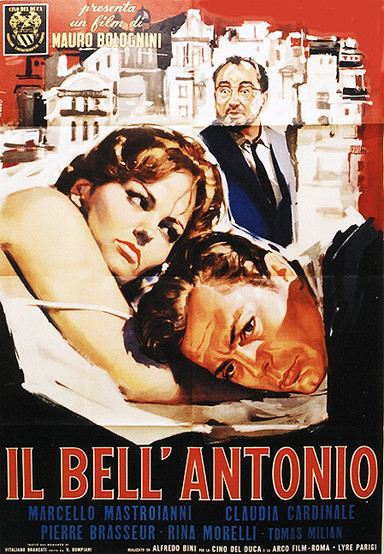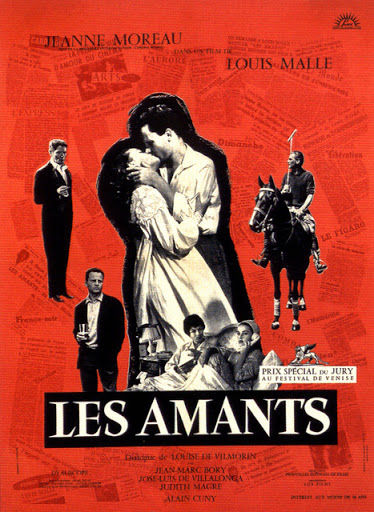"Il Bell'Antonio", Dir: Mauro Bolognini, 1960
- Ravi Swami
- Mar 5, 2022
- 5 min read
"Il Bell'Antonio" (Eng: "Handsome Antonio") is included in a line-up of films either written /adapted by or directed by Pier Paulo Pasolini on Criterion Channel and since my familiarity with Pasolini's name, if not his films, only went as far as his later controversial and often outrageous films before his rather untimely end from a still unsolved murder, I thought I'd check them out.
Cast very much against type as "Antonio Magnano" is Marcello Mastroianni, and by "against type" I mean what resulted from his iconic status in Italian post-war cinema as the archetype of 20th century Italian masculinity, due in large part to his roles in Federico Fellini's films, such as "La Dolce Vita" and "81/2".
Besides focussing on the plight of women, Italian post-war neorealist cinema seemed to have particular interest in male virility, and it's a recurring theme present in several films, often within the comedy genre, something that may be explained by concerns over birth rates following the world wars and the needs of the moment as Italy reconstructed itself.
Another recurring theme is that of the habits of the wealthy metropolitan classes and their attitudes toward women, in particular in the use of brothels, another aspect that possibly reflected the choices available to women facing poverty in post-war Italy and that resulted in the proliferation of such establishments, a subject covered sympathetically in (and also starring Mastroianni) Antonio Pietrangeli's "Adua and Her Friends".
Antonio is a dashingly handsome young man who has acquired a status similar to a pop star in the sense that women fall at his feet without him trying and he wastes no time in pursuing affairs and frequenting brothels while his parents, not especially wealthy middle-class but upwardly mobile, wait for him to settle down.
The film opens with a bedroom scene where his latest conquest implores him to declare his love for her but he shrugs her off, leaving her in tears - he appears troubled and leaves and we are left to assume that as far as he is concerned, she is just another ship passing in the night.
He returns to his parent's apartment home in Rome where his father "Alfio Magnano" (Pierre Brasseur) expresses his concerns over his own failing health before suggesting Antonio settle down with a young woman, "Barbara Puglisi" (Claudia Cardinale) who is the daughter of one his wealthy political connections with a view to improving the family's lot and assuring Antonio's future prospects, but he seems reluctant since he has not seen her and by now he is beginning to tire of his endless merry-go-round of casual affairs and never finding the one woman who will tick all the boxes.
A friend invites him to a private party held by the wealthy Roman elite with the promise that many eligible young women will be present but when they arrive it is revealed to be the equivalent of a Berlusconi "Bunga Bunga" party where older men surround themselves with prostitutes, and Antonio is left to spend the evening with a young woman who virtually begs him to sleep with her and only expresses his disgust about the party whilst being driven home by his friend.
However, at the same party he comes across a photo of the daughter his father's political connection and is instantly smitten, so much so that he tells his parents that he is ready to marry her, and they are overjoyed at the news.
His father arranges an introduction immediately and Antonio meets the woman of his dreams, while his father reluctantly agrees to the terms of the marriage set out by Antonio's future father-in-law, a man of considerable influence in society and more wealthy in comparison to him.
Before long the marriage is conducted and Antonio and his new wife depart for their new life on his father's sprawling country estate full of orange orchards and where hopefully, he will provide her with a secure future.
The first few months of the marriage are an idyll as Antonio promises to draw a line under his past life since he worships his new wife, calling her an "angel", aware that she is also still a virgin, but a shadow is soon cast over the union as his beautiful young wife seems unwilling to consummate the marriage, or so it seems.
A year passes and there is still no good news for either family and eventually Antonio's father-in-law pays a visit to his father with an ultimatum - either the marriage is consummated or he will file for her divorce and have it annulled, something he has the power to do being a lawyer, a prospect that outrages Antonio's father, who vouches for Antonio's virility on the basis of his popularity with women and his many conquests. The two part less than amicably and Antonio's father seeks answers to the problem, which he hopes will come from Antonio's mouth.
When they meet, Antonio evades the issue without giving a proper answer and thinks a year is too soon to begin rearing children but with the dissolution of the marriage looming, his parents become increasingly distraught. His father persuades Antonio's friend to try and extract the reason for the problem and during a long drive Antonio confesses that he is unable to perform, the reason for the lack of libido being due to his earlier profligate lifestyle, something he find deeply distressing since he is besotted by his new wife and utterly in love with her.
As the chances of repairing the marriage dwindle, all hope is lost when Antonio's father-in -law announces the marriage of Barbara to a super-wealthy aristocrat following a heated exchange between Barbara and Antonio's mother who meets her to try and save the marriage - the honour of the Puglisi family is at stake and her father's reputation would suffer from the shame surrounding the fact that Antonio could not perform the basic duties of a husband.
Antonio returns to his parent's apartment after witnessing his former wife and the love of his life drive off after her marriage to her new husband, while his devout mother thinks his impotence is a punishment for his promiscuity.
Soon after, his mother summons the family maid, a rather plain young woman named Santuzza who nurses a secret crush on Antonio, like most women who meet him, which includes the daughter of his neighbour which provides some of the few comedic moments in a film which I would struggle to describe as a comedy. When Santuzza suddenly collapses in a faint it is revealed that she is pregnant and Antonio admits to being responsible.
Far from causing an uproar of disapproval, Antonio's parents are filled with joy and celebrate the news since his manhood has been restored, insisting that he tie the knot with Santuzza to avoid scandal and more importantly to reinstate his reputation as the town's Romeo.
The film ends on a shot of Antonio's reflection in a marble wall as he talks to his friend on the phone, who asks him to renounce his old ways and give up on his search for the ideal woman to live a normal married life, and as Antonio weeps bitter tears of regret over the loss of Barbara as he ponders his future, his reflection gradually fades away.
"Il Bell'Antonio" is a morality tale that touches on the popular Italian insult of "cornuto", or cuckold, that is so deeply ingrained in the culture as to be the subject of many comedies, both literary and cinematic, and that has a history going back to the earliest dramatic works of Aristophanes and others - the final insult to male virility from a culture that values it highly and that explains the popularity of many Italian sex comedies while dealing sensitively with the taboo topic of male impotence without resorting to broad comedy.
"Il Bell'Antonio", Dir: Mauro Bolognini. Adaptation: Pier Paulo Pasolini, 1960
Criterion Channel










Comments